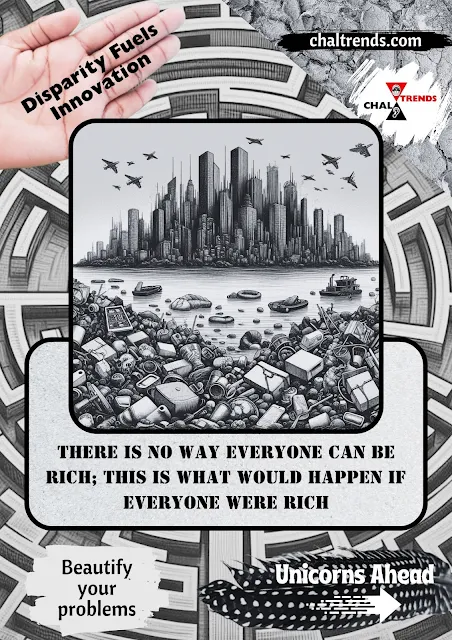The Illusion of Universal Wealth: Consequences of Everyone Being Rich
Introduction:
In the realm of economic aspirations, the notion of universal wealth often glimmers as an idealistic beacon. However, upon closer examination, it becomes evident that such a scenario is unattainable and fraught with potential repercussions. Let's explore eight key points that illuminate the consequences if everyone were rich.
1. Economic Realities:
The fundamental principle of economics dictates scarcity—a situation where unlimited wants meet limited resources. If everyone were rich, the very essence of wealth would lose its significance. Economic systems rely on disparities in wealth to function, as wealth serves as a motivator for innovation, productivity, and resource allocation.
2. Inflationary Pressures:
With universal wealth, the demand for goods and services would skyrocket, inevitably leading to inflation. As purchasing power increases across the board, the relative value of money diminishes, resulting in a vicious cycle where prices spiral upwards, eroding the wealth of all.
3. Persistent Inequality:
While universal wealth may appear to level the economic playing field, the reality suggests otherwise. Historical and structural inequalities would persist, with the affluent finding new avenues to amass wealth, further widening the gap between the haves and the have-nots.
4. Environmental Degradation:
The pursuit of opulence often comes at the expense of the environment. With universal wealth, consumption would surge, exacerbating resource depletion, pollution, and climate change. The delicate balance between economic prosperity and ecological sustainability would be irreparably disrupted.
5. Diminished Work Ethic:
The ethos of hard work and perseverance, integral to societal progress, would wane in a world of universal wealth. Without the need to strive for financial security, the incentive to innovate, create, and contribute to society would diminish, stalling human advancement.
6. Strained Social Fabric:
The fabric of society thrives on diversity, cooperation, and shared aspirations. However, in a world where everyone is rich, the social dynamics would undergo a seismic shift. Status hierarchies, once grounded in economic disparity, would unravel, leading to a sense of disconnection and alienation.
7. Overconsumption and Waste:
Abundance breeds excess. In a scenario where everyone is rich, overconsumption would run rampant, leading to a surge in waste generation and environmental degradation. The pursuit of material wealth would eclipse considerations of sustainability and stewardship.
8. Psychological Toll:
Beyond the material implications, universal wealth would exact a profound psychological toll on individuals. The relentless pursuit of affluence and status would foster a culture of anxiety, comparison, and dissatisfaction, undermining holistic well-being.
Conclusion:
In the grand tapestry of human aspirations, the allure of universal wealth may shimmer with tantalizing promise. However, a closer inspection reveals a stark reality—such a scenario is not only unattainable but also fraught with perilous consequences. As we navigate the complexities of economic progress, let us remember that true prosperity lies not in the accumulation of wealth but in the cultivation of shared well-being, sustainability, and equity.
(Don't stop here! We have more exciting content related to Economic waiting for you)











.jpeg)





0 Comments